-
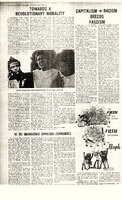 Capitalism + Racism Breed Fascism, Newspaper Article.
Capitalism + Racism Breed Fascism, Newspaper Article. A newspaper article from The Black Panther arguing that the greed inherent in capitalism leads to racism which leads to a fascist state defined by police brutality on Black people. The author writes that capitalism is “a parasitic growth that devours whole countries,” and therefore police brutality is a form of genocidal extermination.
-
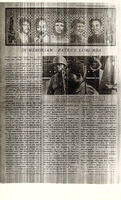 In memoriam-Patrice Lumumba, Newspaper Article.
In memoriam-Patrice Lumumba, Newspaper Article. A newspaper article from The Black Panther telling the story of Patrice Lumumba, who became the first prime minister of the Republic of the Congo in June of 1960, shortly after Congo gained independence from Belgium. He was assassinated in January of 1961 and is an icon in the anti-colonial movement that was embraced by the Black Panther Party.
-
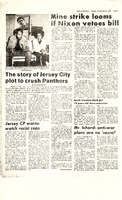 The Story of Jersey City Plot to Crush Panthers, Newspaper Article.
The Story of Jersey City Plot to Crush Panthers, Newspaper Article. A newspaper article from Daily World, a newspaper in Jersey City, New Jersey. Jimmy York, the deputy chairman of the Jersey Branch of the Black Panther Party, talks to the writer about harassment the Black Panthers in the city face from the police, including bogus arrests with excessive bail and raids on homes and Party headquarters.
-
 Gang Members Told to Stop Killings, Newspaper Article.
Gang Members Told to Stop Killings, Newspaper Article. A newspaper article from The Black Panther that describes the calls from Philadelphia, Pennsylvania Party leaders for gangs in the city to stop the violence and “get together to form a ‘People’s Army,’” This call was made during a three day conference in Philadelphia that brought together gang members and Party leaders to discuss ending violence.
-
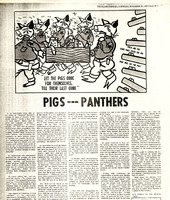 Pigs---Panthers, Newspaper Article.
Pigs---Panthers, Newspaper Article. A newspaper article from The Black Panther that examines the relationship between the police and the Black Panther Party through the lens of capitalism. The author, Candy (no last name listed), writes that capitalism in the oppressor and those who fight against capitalism are fighting against the government and the police force that protects it.
-
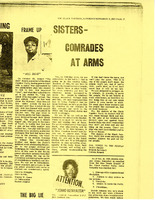 Sisters-Comrades at Arms, Newspaper Article.
Sisters-Comrades at Arms, Newspaper Article. A newspaper article from The Black Panther by Jackie Harper, Branch Secretary of the Corona Branch of the Black Panther Party. She tells the story of Robert “Big Bob” Heard who was framed for assault by the police and declares that the women of the Party will stand in solidarity with their brothers in the Party against the racist police forces.
-
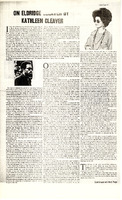 On Eldridge Cleaver by Kathleen Cleaver, Newspaper Article.
On Eldridge Cleaver by Kathleen Cleaver, Newspaper Article. A newspaper article from The Black Panther by Kathleen Cleaver about her relationship with her then-husband Eldridge Cleaver and the legal issues he faced after an April 6, 1968 shootout with the police in Oakland, California. It is noted at the end of the article that it was reprinted from Ramparts Magazine.
-
 John Huggins Memorial Breakfast Program, Newspaper Article.
John Huggins Memorial Breakfast Program, Newspaper Article. A newspaper article from The Black Panther about the free breakfast program in New Haven, Connecticut. The first free breakfast program in New Haven began on October 8, 1969, and is named after John Huggins, a Black Panther originally from New Haven who was murdered on January 17, 1969, in Los Angeles, California.
-
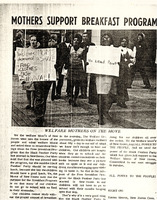 Mothers Support Breakfast Program, Newspaper Article.
Mothers Support Breakfast Program, Newspaper Article. A newspaper article by Emma Simms of New Haven, Connecticut, in The Black Panther about the free breakfast program in New Haven. She writes on behalf of “the welfare moms of New Haven,” saying that welfare money doesn’t provide enough money for adequate food for children and the Black Panthers are filling that void in the community.
-
 Socialism: Serving the People, Newspaper Article.
Socialism: Serving the People, Newspaper Article. A newspaper article by Lieutenant of Health of the Corona Branch, NY chapter of the Black Panther Party, Diahnne Jenkins, from The Black Panther about the Black Panther programs such as free breakfast, free health care, and free clothing drives. She writes that these programs are all a part of organizing and educating the masses.
-
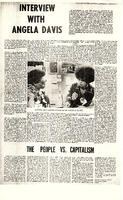 Interview with Angela Davis, Newspaper Article.
Interview with Angela Davis, Newspaper Article. A newspaper article from The Black Panther. Connie Matthews interviews Black Panther Party Member and assistant professor Angela Davis following her dismissal from the University of California in September 1969 after she had been fired by the Philosophy Department on the basis of her membership in the Communist Party.
-
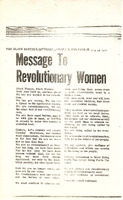 Message to Revolutionary Women, Newspaper Article.
Message to Revolutionary Women, Newspaper Article. A newspaper article by Candi Robinson from The Black Panther. The poem style article calls for gender equality in the Black liberation movement.
-
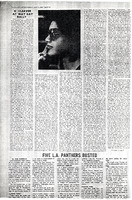 K Cleaver at May Day Rally, Newspaper Article.
K Cleaver at May Day Rally, Newspaper Article. A newspaper article from The Black Panther. It is a transcript of Kathleen Cleaver's speech at May Day (International Workers Day) on May 1, 1969 in San Francisco, California. Cleaver’s speech, like many of the speeches given that day, centered on the calls to Free Huey Newton from his arrest on murder charges on October 28, 1967.
-
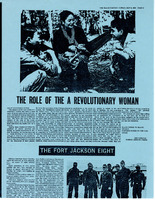 The Role of the A Revolutionary Woman, Newspaper Article.
The Role of the A Revolutionary Woman, Newspaper Article. A newspaper article from The Black Panther. by June Culberson about the historical and worldly context of women in revolutionary movements. She writes that examples by women from China, Cuba, and Vietnam shows that women can and should be on equal footing with men in the revolutionary actions of the Black Panther Party.
-
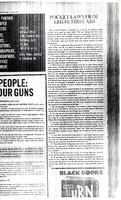 Pocket Lawyer of Legal First Aid, Newspaper Article.
Pocket Lawyer of Legal First Aid, Newspaper Article. A newspaper article from The Black Panther. It outlines the 14 steps for Black people concerning Constitutional rights if confronted or arrested by the police. The article suggests that readers cut the article out of the paper and carry it with them in case of confrontations with the police.
-
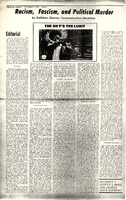 Racism, Fascism, and Political Muder, Newspaper Article.
Racism, Fascism, and Political Muder, Newspaper Article. A newspaper article written by Communications Secretary Kathleen Cleaver in The Black Panther. The article, in response to the Kerner Commission report ordered by President Lyndon B. Johnson to look into the causes of the 1967 uprisings in several U.S. cities, argues that the government hadn’t done enough to combat systemic racism.
-
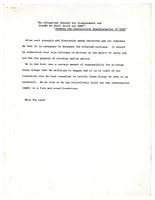 Towards the Constructive Transformation of the NAWO, an essay.
Towards the Constructive Transformation of the NAWO, an essay. An essay that critiques certain aspects of the New Afrikan Women's Organization (NAWO). The author notes that "this critique is written in the spirit of unity and not for the purpose of dividing and/or malice."
-
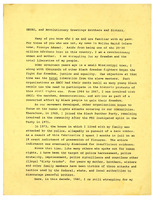 A letter written by Frankye Adams Johnson (Malika) to her supporters, 1980.
A letter written by Frankye Adams Johnson (Malika) to her supporters, 1980. Frankye Adams Johnson (Malika) writes this letter to her supporters outlining the criminal charges she is facing in 1980 stemming from a 1974 arrest. She is asking for any support that may be given to her during this time.
-
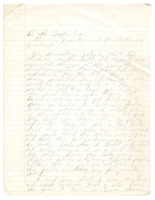 Handwritten correspondence to the Comrades from Frankye Adams Johnson (Malika).
Handwritten correspondence to the Comrades from Frankye Adams Johnson (Malika). A short essay about the revolutionary killing of cops. The author gives two recent examples of revolutionaries killing cops, saying the killers are urban guerillas who constitute the military arm of the Black Liberation Army (BLA). The tag-line of the essay is “All Power to the New Urban Guerilla, War to the End.”
-
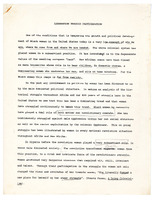 Liberation Through Participation, an essay.
Liberation Through Participation, an essay. Bernice Jones (aka Safiya Bukhari) was a Black Panther Party member and vice president of the Republic of New Afrika. In this essay, she writes about the concept of New Afrikan Women and the New Afrikan Women's Organization (NAWO).
-
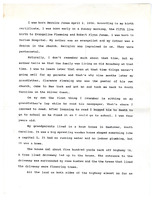 Bernice Jones personal narrative.
Bernice Jones personal narrative. Bernice Jones (aka Safiya Bukhari) was a Black Panther Party member and vice president of the Republic of New Afrika. In this personal narrative, she tells her life story from the time of her birth in 1950 until her time in high school.
-
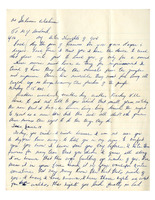 Letter from Frankye Adams-Johnson (Malika) to Nuh Abdul Qaiyum, June 1973.
Letter from Frankye Adams-Johnson (Malika) to Nuh Abdul Qaiyum, June 1973. A letter from Frankye Adams-Johnson (Malika) to her husband, Nuh Abdul Qaiyum, who was sentenced to prison in 1975 for a 1971 Black Liberation Army (BLA) connected shooting of police officers in New York. She writes about her feelings and the effects their meetings at the prison are having on her.
-
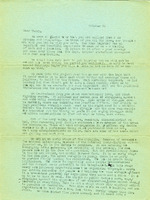 Anonymous correspondence between two revolutionaries, October 26 (year unknown).
Anonymous correspondence between two revolutionaries, October 26 (year unknown). A letter from "M" to Terry. The author writes that it is the early days of the struggle and there is an opportunity to organize the people for revolutionary struggle, giving specific examples of work that can be done in communities to gain the support of the people. Tenets such as internationalism, organization, and Marxism-Leninism are discussed.
-
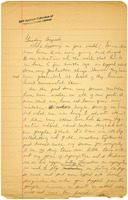 Anonymous correspondence between two Black Liberation movement leaders, date unknown.
Anonymous correspondence between two Black Liberation movement leaders, date unknown. A letter from Terry to an unknown recipient. The author writes that they need to put past mistakes behind them to begin seriously organizing for the fight for liberation. He makes the argument that a propaganda campaign will be needed to gain the support of the masses.
-
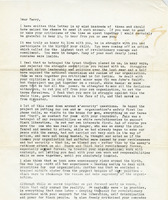 Anonymous correspondence between a white revolutionary and a Black Liberation movement leader, date unknown.
Anonymous correspondence between a white revolutionary and a Black Liberation movement leader, date unknown. Maggie/Jean, a white revolutionary, writes to an unknown Black Liberation movement leader. The author is apologizing for the way white revolutionaries dealt with the struggle for Black liberation during the time they worked together. The writer says that the criticisms of their group exposed the national chauvinism and racism of their organization.
 Capitalism + Racism Breed Fascism, Newspaper Article. A newspaper article from The Black Panther arguing that the greed inherent in capitalism leads to racism which leads to a fascist state defined by police brutality on Black people. The author writes that capitalism is “a parasitic growth that devours whole countries,” and therefore police brutality is a form of genocidal extermination.
Capitalism + Racism Breed Fascism, Newspaper Article. A newspaper article from The Black Panther arguing that the greed inherent in capitalism leads to racism which leads to a fascist state defined by police brutality on Black people. The author writes that capitalism is “a parasitic growth that devours whole countries,” and therefore police brutality is a form of genocidal extermination. In memoriam-Patrice Lumumba, Newspaper Article. A newspaper article from The Black Panther telling the story of Patrice Lumumba, who became the first prime minister of the Republic of the Congo in June of 1960, shortly after Congo gained independence from Belgium. He was assassinated in January of 1961 and is an icon in the anti-colonial movement that was embraced by the Black Panther Party.
In memoriam-Patrice Lumumba, Newspaper Article. A newspaper article from The Black Panther telling the story of Patrice Lumumba, who became the first prime minister of the Republic of the Congo in June of 1960, shortly after Congo gained independence from Belgium. He was assassinated in January of 1961 and is an icon in the anti-colonial movement that was embraced by the Black Panther Party. The Story of Jersey City Plot to Crush Panthers, Newspaper Article. A newspaper article from Daily World, a newspaper in Jersey City, New Jersey. Jimmy York, the deputy chairman of the Jersey Branch of the Black Panther Party, talks to the writer about harassment the Black Panthers in the city face from the police, including bogus arrests with excessive bail and raids on homes and Party headquarters.
The Story of Jersey City Plot to Crush Panthers, Newspaper Article. A newspaper article from Daily World, a newspaper in Jersey City, New Jersey. Jimmy York, the deputy chairman of the Jersey Branch of the Black Panther Party, talks to the writer about harassment the Black Panthers in the city face from the police, including bogus arrests with excessive bail and raids on homes and Party headquarters. Gang Members Told to Stop Killings, Newspaper Article. A newspaper article from The Black Panther that describes the calls from Philadelphia, Pennsylvania Party leaders for gangs in the city to stop the violence and “get together to form a ‘People’s Army,’” This call was made during a three day conference in Philadelphia that brought together gang members and Party leaders to discuss ending violence.
Gang Members Told to Stop Killings, Newspaper Article. A newspaper article from The Black Panther that describes the calls from Philadelphia, Pennsylvania Party leaders for gangs in the city to stop the violence and “get together to form a ‘People’s Army,’” This call was made during a three day conference in Philadelphia that brought together gang members and Party leaders to discuss ending violence. Pigs---Panthers, Newspaper Article. A newspaper article from The Black Panther that examines the relationship between the police and the Black Panther Party through the lens of capitalism. The author, Candy (no last name listed), writes that capitalism in the oppressor and those who fight against capitalism are fighting against the government and the police force that protects it.
Pigs---Panthers, Newspaper Article. A newspaper article from The Black Panther that examines the relationship between the police and the Black Panther Party through the lens of capitalism. The author, Candy (no last name listed), writes that capitalism in the oppressor and those who fight against capitalism are fighting against the government and the police force that protects it. Sisters-Comrades at Arms, Newspaper Article. A newspaper article from The Black Panther by Jackie Harper, Branch Secretary of the Corona Branch of the Black Panther Party. She tells the story of Robert “Big Bob” Heard who was framed for assault by the police and declares that the women of the Party will stand in solidarity with their brothers in the Party against the racist police forces.
Sisters-Comrades at Arms, Newspaper Article. A newspaper article from The Black Panther by Jackie Harper, Branch Secretary of the Corona Branch of the Black Panther Party. She tells the story of Robert “Big Bob” Heard who was framed for assault by the police and declares that the women of the Party will stand in solidarity with their brothers in the Party against the racist police forces. On Eldridge Cleaver by Kathleen Cleaver, Newspaper Article. A newspaper article from The Black Panther by Kathleen Cleaver about her relationship with her then-husband Eldridge Cleaver and the legal issues he faced after an April 6, 1968 shootout with the police in Oakland, California. It is noted at the end of the article that it was reprinted from Ramparts Magazine.
On Eldridge Cleaver by Kathleen Cleaver, Newspaper Article. A newspaper article from The Black Panther by Kathleen Cleaver about her relationship with her then-husband Eldridge Cleaver and the legal issues he faced after an April 6, 1968 shootout with the police in Oakland, California. It is noted at the end of the article that it was reprinted from Ramparts Magazine. John Huggins Memorial Breakfast Program, Newspaper Article. A newspaper article from The Black Panther about the free breakfast program in New Haven, Connecticut. The first free breakfast program in New Haven began on October 8, 1969, and is named after John Huggins, a Black Panther originally from New Haven who was murdered on January 17, 1969, in Los Angeles, California.
John Huggins Memorial Breakfast Program, Newspaper Article. A newspaper article from The Black Panther about the free breakfast program in New Haven, Connecticut. The first free breakfast program in New Haven began on October 8, 1969, and is named after John Huggins, a Black Panther originally from New Haven who was murdered on January 17, 1969, in Los Angeles, California. Mothers Support Breakfast Program, Newspaper Article. A newspaper article by Emma Simms of New Haven, Connecticut, in The Black Panther about the free breakfast program in New Haven. She writes on behalf of “the welfare moms of New Haven,” saying that welfare money doesn’t provide enough money for adequate food for children and the Black Panthers are filling that void in the community.
Mothers Support Breakfast Program, Newspaper Article. A newspaper article by Emma Simms of New Haven, Connecticut, in The Black Panther about the free breakfast program in New Haven. She writes on behalf of “the welfare moms of New Haven,” saying that welfare money doesn’t provide enough money for adequate food for children and the Black Panthers are filling that void in the community. Socialism: Serving the People, Newspaper Article. A newspaper article by Lieutenant of Health of the Corona Branch, NY chapter of the Black Panther Party, Diahnne Jenkins, from The Black Panther about the Black Panther programs such as free breakfast, free health care, and free clothing drives. She writes that these programs are all a part of organizing and educating the masses.
Socialism: Serving the People, Newspaper Article. A newspaper article by Lieutenant of Health of the Corona Branch, NY chapter of the Black Panther Party, Diahnne Jenkins, from The Black Panther about the Black Panther programs such as free breakfast, free health care, and free clothing drives. She writes that these programs are all a part of organizing and educating the masses. Interview with Angela Davis, Newspaper Article. A newspaper article from The Black Panther. Connie Matthews interviews Black Panther Party Member and assistant professor Angela Davis following her dismissal from the University of California in September 1969 after she had been fired by the Philosophy Department on the basis of her membership in the Communist Party.
Interview with Angela Davis, Newspaper Article. A newspaper article from The Black Panther. Connie Matthews interviews Black Panther Party Member and assistant professor Angela Davis following her dismissal from the University of California in September 1969 after she had been fired by the Philosophy Department on the basis of her membership in the Communist Party. Message to Revolutionary Women, Newspaper Article. A newspaper article by Candi Robinson from The Black Panther. The poem style article calls for gender equality in the Black liberation movement.
Message to Revolutionary Women, Newspaper Article. A newspaper article by Candi Robinson from The Black Panther. The poem style article calls for gender equality in the Black liberation movement. K Cleaver at May Day Rally, Newspaper Article. A newspaper article from The Black Panther. It is a transcript of Kathleen Cleaver's speech at May Day (International Workers Day) on May 1, 1969 in San Francisco, California. Cleaver’s speech, like many of the speeches given that day, centered on the calls to Free Huey Newton from his arrest on murder charges on October 28, 1967.
K Cleaver at May Day Rally, Newspaper Article. A newspaper article from The Black Panther. It is a transcript of Kathleen Cleaver's speech at May Day (International Workers Day) on May 1, 1969 in San Francisco, California. Cleaver’s speech, like many of the speeches given that day, centered on the calls to Free Huey Newton from his arrest on murder charges on October 28, 1967. The Role of the A Revolutionary Woman, Newspaper Article. A newspaper article from The Black Panther. by June Culberson about the historical and worldly context of women in revolutionary movements. She writes that examples by women from China, Cuba, and Vietnam shows that women can and should be on equal footing with men in the revolutionary actions of the Black Panther Party.
The Role of the A Revolutionary Woman, Newspaper Article. A newspaper article from The Black Panther. by June Culberson about the historical and worldly context of women in revolutionary movements. She writes that examples by women from China, Cuba, and Vietnam shows that women can and should be on equal footing with men in the revolutionary actions of the Black Panther Party. Pocket Lawyer of Legal First Aid, Newspaper Article. A newspaper article from The Black Panther. It outlines the 14 steps for Black people concerning Constitutional rights if confronted or arrested by the police. The article suggests that readers cut the article out of the paper and carry it with them in case of confrontations with the police.
Pocket Lawyer of Legal First Aid, Newspaper Article. A newspaper article from The Black Panther. It outlines the 14 steps for Black people concerning Constitutional rights if confronted or arrested by the police. The article suggests that readers cut the article out of the paper and carry it with them in case of confrontations with the police. Racism, Fascism, and Political Muder, Newspaper Article. A newspaper article written by Communications Secretary Kathleen Cleaver in The Black Panther. The article, in response to the Kerner Commission report ordered by President Lyndon B. Johnson to look into the causes of the 1967 uprisings in several U.S. cities, argues that the government hadn’t done enough to combat systemic racism.
Racism, Fascism, and Political Muder, Newspaper Article. A newspaper article written by Communications Secretary Kathleen Cleaver in The Black Panther. The article, in response to the Kerner Commission report ordered by President Lyndon B. Johnson to look into the causes of the 1967 uprisings in several U.S. cities, argues that the government hadn’t done enough to combat systemic racism. Towards the Constructive Transformation of the NAWO, an essay. An essay that critiques certain aspects of the New Afrikan Women's Organization (NAWO). The author notes that "this critique is written in the spirit of unity and not for the purpose of dividing and/or malice."
Towards the Constructive Transformation of the NAWO, an essay. An essay that critiques certain aspects of the New Afrikan Women's Organization (NAWO). The author notes that "this critique is written in the spirit of unity and not for the purpose of dividing and/or malice." A letter written by Frankye Adams Johnson (Malika) to her supporters, 1980. Frankye Adams Johnson (Malika) writes this letter to her supporters outlining the criminal charges she is facing in 1980 stemming from a 1974 arrest. She is asking for any support that may be given to her during this time.
A letter written by Frankye Adams Johnson (Malika) to her supporters, 1980. Frankye Adams Johnson (Malika) writes this letter to her supporters outlining the criminal charges she is facing in 1980 stemming from a 1974 arrest. She is asking for any support that may be given to her during this time. Handwritten correspondence to the Comrades from Frankye Adams Johnson (Malika). A short essay about the revolutionary killing of cops. The author gives two recent examples of revolutionaries killing cops, saying the killers are urban guerillas who constitute the military arm of the Black Liberation Army (BLA). The tag-line of the essay is “All Power to the New Urban Guerilla, War to the End.”
Handwritten correspondence to the Comrades from Frankye Adams Johnson (Malika). A short essay about the revolutionary killing of cops. The author gives two recent examples of revolutionaries killing cops, saying the killers are urban guerillas who constitute the military arm of the Black Liberation Army (BLA). The tag-line of the essay is “All Power to the New Urban Guerilla, War to the End.” Liberation Through Participation, an essay. Bernice Jones (aka Safiya Bukhari) was a Black Panther Party member and vice president of the Republic of New Afrika. In this essay, she writes about the concept of New Afrikan Women and the New Afrikan Women's Organization (NAWO).
Liberation Through Participation, an essay. Bernice Jones (aka Safiya Bukhari) was a Black Panther Party member and vice president of the Republic of New Afrika. In this essay, she writes about the concept of New Afrikan Women and the New Afrikan Women's Organization (NAWO). Bernice Jones personal narrative. Bernice Jones (aka Safiya Bukhari) was a Black Panther Party member and vice president of the Republic of New Afrika. In this personal narrative, she tells her life story from the time of her birth in 1950 until her time in high school.
Bernice Jones personal narrative. Bernice Jones (aka Safiya Bukhari) was a Black Panther Party member and vice president of the Republic of New Afrika. In this personal narrative, she tells her life story from the time of her birth in 1950 until her time in high school. Letter from Frankye Adams-Johnson (Malika) to Nuh Abdul Qaiyum, June 1973. A letter from Frankye Adams-Johnson (Malika) to her husband, Nuh Abdul Qaiyum, who was sentenced to prison in 1975 for a 1971 Black Liberation Army (BLA) connected shooting of police officers in New York. She writes about her feelings and the effects their meetings at the prison are having on her.
Letter from Frankye Adams-Johnson (Malika) to Nuh Abdul Qaiyum, June 1973. A letter from Frankye Adams-Johnson (Malika) to her husband, Nuh Abdul Qaiyum, who was sentenced to prison in 1975 for a 1971 Black Liberation Army (BLA) connected shooting of police officers in New York. She writes about her feelings and the effects their meetings at the prison are having on her. Anonymous correspondence between two revolutionaries, October 26 (year unknown). A letter from "M" to Terry. The author writes that it is the early days of the struggle and there is an opportunity to organize the people for revolutionary struggle, giving specific examples of work that can be done in communities to gain the support of the people. Tenets such as internationalism, organization, and Marxism-Leninism are discussed.
Anonymous correspondence between two revolutionaries, October 26 (year unknown). A letter from "M" to Terry. The author writes that it is the early days of the struggle and there is an opportunity to organize the people for revolutionary struggle, giving specific examples of work that can be done in communities to gain the support of the people. Tenets such as internationalism, organization, and Marxism-Leninism are discussed. Anonymous correspondence between two Black Liberation movement leaders, date unknown. A letter from Terry to an unknown recipient. The author writes that they need to put past mistakes behind them to begin seriously organizing for the fight for liberation. He makes the argument that a propaganda campaign will be needed to gain the support of the masses.
Anonymous correspondence between two Black Liberation movement leaders, date unknown. A letter from Terry to an unknown recipient. The author writes that they need to put past mistakes behind them to begin seriously organizing for the fight for liberation. He makes the argument that a propaganda campaign will be needed to gain the support of the masses. Anonymous correspondence between a white revolutionary and a Black Liberation movement leader, date unknown. Maggie/Jean, a white revolutionary, writes to an unknown Black Liberation movement leader. The author is apologizing for the way white revolutionaries dealt with the struggle for Black liberation during the time they worked together. The writer says that the criticisms of their group exposed the national chauvinism and racism of their organization.
Anonymous correspondence between a white revolutionary and a Black Liberation movement leader, date unknown. Maggie/Jean, a white revolutionary, writes to an unknown Black Liberation movement leader. The author is apologizing for the way white revolutionaries dealt with the struggle for Black liberation during the time they worked together. The writer says that the criticisms of their group exposed the national chauvinism and racism of their organization.